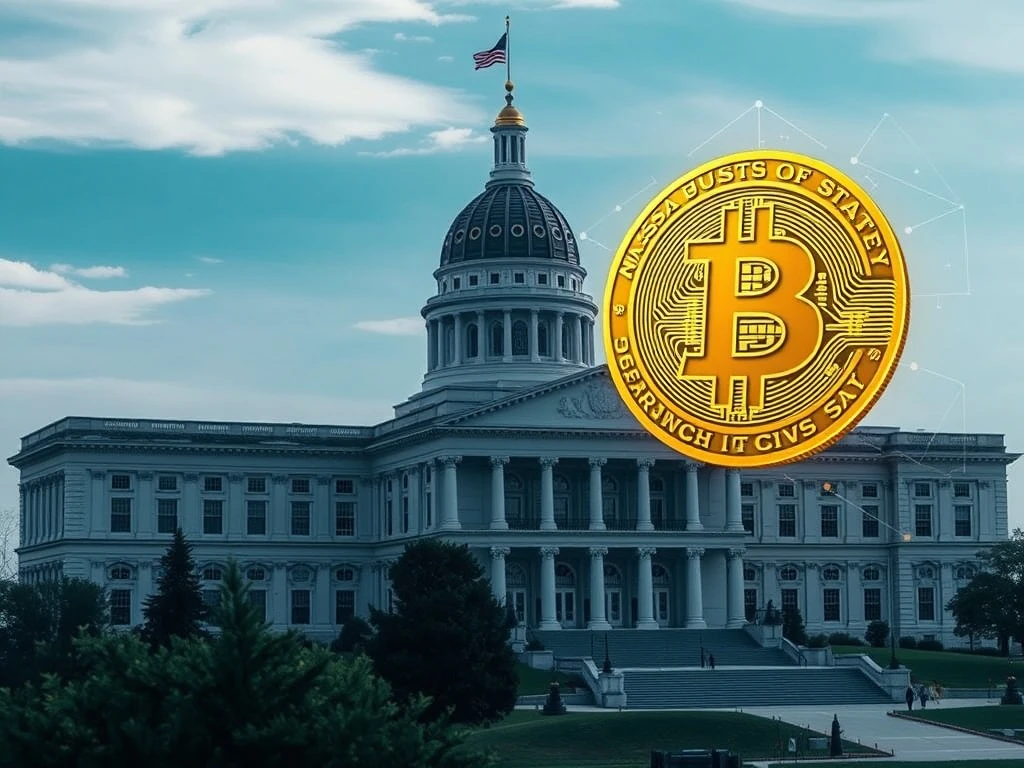Crucial Bitcoin Reserve Bill Hearing Ignites Debate in Massachusetts

The world of finance is constantly evolving, and cryptocurrencies are at the forefront of this transformation. Enthusiasts and policymakers alike are closely watching as the U.S. state of Massachusetts takes a significant step. A **Bitcoin reserve bill** is currently under consideration, sparking widespread interest across the digital asset community. This legislative move could signal a new era for state-level engagement with decentralized finance.
Massachusetts Considers Pioneering Bitcoin Reserve Bill
Massachusetts’ Joint Revenue Committee is set to hold a hearing on a proposed **Bitcoin reserve bill**. Republican state Senator Peter Durant introduced this significant legislation in February. This bill, officially titled “relative to a Bitcoin strategic reserve,” represents a growing trend among U.S. states. It aims to establish a framework for the Commonwealth to manage and potentially invest in digital assets. For many, this hearing marks a pivotal moment, as it brings the discussion of cryptocurrency into the formal legislative process of a major U.S. state.
The core tenets of Senator Durant’s proposal are straightforward yet impactful:
- It would permit the Commonwealth to deposit any **Bitcoin or other digital asset seized** by the state into a dedicated reserve.
- Furthermore, the bill authorizes the state treasury to allocate up to 10% of the Commonwealth Stabilization Fund for investment in cryptocurrencies.
Such a move highlights a proactive stance towards integrating digital assets into traditional state financial strategies. The legislation reflects a broader push by Republican lawmakers in various states to explore cryptocurrency and Bitcoin (BTC) reserves. This initiative signals a potential shift in how states perceive and utilize digital currencies.

Political Hurdles for Massachusetts Crypto Legislation
Despite the growing enthusiasm for digital assets, the path for this **Massachusetts crypto** bill is not without significant political challenges. The state’s legislative landscape presents a formidable barrier. Democrats hold a supermajority in both the Massachusetts House of Representatives and Senate. They also control the governorship. Moreover, all of the state’s representatives in the U.S. House and Senate are Democrats. Consequently, any Republican-led bill faces an uphill battle to gain traction and ultimately pass.
The current political climate suggests that bipartisan support would be crucial for the bill’s success. Without it, the legislation may struggle to move beyond the committee stage. This scenario reflects the broader political polarization often seen in emerging policy areas like cryptocurrency regulation. Stakeholders are watching closely to see if the economic arguments for a strategic reserve can transcend partisan lines.
The National Trend: Embracing State Cryptocurrency Reserves
Massachusetts is not alone in exploring the potential of **state cryptocurrency** reserves. A growing number of U.S. states are considering similar legislative measures. These initiatives often mirror federal discussions regarding digital asset stockpiles. For instance, U.S. President Donald Trump signed an executive order in March to establish a government stockpile of BTC and other cryptocurrencies. This order partially relies on seized assets. Republican lawmakers are actively attempting to codify this order into law through Congress via the BITCOIN Act.
Several states have already made progress in this area. New Hampshire and Texas, for example, have passed legislation allowing them to hold Bitcoin and other cryptocurrencies as part of a strategic reserve plan. These states recognize the potential benefits of diversifying their financial holdings with digital assets. This includes hedging against inflation and exploring new avenues for economic growth. The ongoing discussions in Massachusetts contribute to this expanding national dialogue.
Driving Digital Asset Legislation: Economic and Strategic Benefits
The push for **digital asset legislation** stems from various economic and strategic motivations. Proponents argue that holding cryptocurrencies like Bitcoin can serve as a valuable hedge against inflation. This strategy mirrors approaches taken by prominent corporate entities. Michael Saylor’s MicroStrategy, for example, has famously invested heavily in Bitcoin for years. Many other companies reportedly followed suit in 2025 after Trump’s executive order, recognizing Bitcoin’s potential as a store of value.
Key arguments for establishing state-level crypto reserves include:
- Inflation Hedge: Bitcoin’s finite supply makes it an attractive asset during periods of monetary expansion.
- Diversification: Adding digital assets can diversify state treasuries, reducing reliance on traditional asset classes.
- Innovation: Engaging with crypto signals a state’s commitment to embracing technological innovation and attracting related industries.
- Seized Asset Utilization: Efficiently managing and potentially growing value from seized illicit crypto assets.
These benefits highlight why states are increasingly viewing digital assets not just as a speculative venture, but as a legitimate component of a forward-thinking financial strategy.
Challenges and the Future of Crypto Strategic Reserve Bills
While the allure of a **crypto strategic reserve** is strong, the concept faces considerable skepticism and practical challenges. A crypto executive previously suggested that a Bitcoin strategic reserve might be detrimental for both BTC and USD. Concerns often revolve around:
- Volatility: The inherent price fluctuations of cryptocurrencies pose risks to state funds.
- Regulatory Uncertainty: The evolving regulatory landscape creates an unpredictable environment for long-term holdings.
- Security Risks: Managing and securing digital assets requires specialized expertise and infrastructure to prevent hacks or loss.
Indeed, several states have already rejected or failed to advance similar bills. In 2025, Montana, North Dakota, Pennsylvania, South Dakota, and Wyoming saw their proposed legislation stall. However, the conversation continues in other states. Proposed legislation in Michigan and Ohio, for instance, could still be signed into law. This indicates a persistent interest in the concept, despite past setbacks.
The Massachusetts hearing is a microcosm of this larger national debate. Its outcome will offer valuable insights into the political viability and public perception of state-backed cryptocurrency initiatives. As digital assets become more integrated into the global financial system, states will continue to grapple with how best to incorporate them into their economic strategies. The legislative journey of the Bitcoin reserve bill in Massachusetts is therefore a significant one, regardless of its immediate fate.








